ROSS RYAN
Perth - Sydney - USA - Melbourne
1970-present
 Ross
Ryan is one of Australia's most
respected and successful singer-songwriters. Like his contemporaries Greg Quill and Mike
McClellan, he emerged from the folk scene, and enjoyed brief
chart
prominence in the mid-70's with his 1974 hit single "I Am Pegasus", for
which he is probably best remembered these days. But like Greg and
Mike, Ross'
shortlived burst of fame (and the fickle nature of the music
scene) led to an undeserved tag as a 'one-hit wonder', and this has
tended to obscure the
body of fine work Ross produced before and since his short burst of
chart success. Ross's songs have also
been covered by leading Australian artists such as John Farnham ("I
Must
Stay") and Slim Dusty ("Isa"). Humour has always been an important part
of
Ross's writing, and he has brought this aspect to the fore in recent
years with his own successful one-man show at the Adelaide Fringe
Festival, a revue at the Melbourne Comedy Festival, and recent
collaborations with comedy artists like Rod Quantock.
Ross
Ryan is one of Australia's most
respected and successful singer-songwriters. Like his contemporaries Greg Quill and Mike
McClellan, he emerged from the folk scene, and enjoyed brief
chart
prominence in the mid-70's with his 1974 hit single "I Am Pegasus", for
which he is probably best remembered these days. But like Greg and
Mike, Ross'
shortlived burst of fame (and the fickle nature of the music
scene) led to an undeserved tag as a 'one-hit wonder', and this has
tended to obscure the
body of fine work Ross produced before and since his short burst of
chart success. Ross's songs have also
been covered by leading Australian artists such as John Farnham ("I
Must
Stay") and Slim Dusty ("Isa"). Humour has always been an important part
of
Ross's writing, and he has brought this aspect to the fore in recent
years with his own successful one-man show at the Adelaide Fringe
Festival, a revue at the Melbourne Comedy Festival, and recent
collaborations with comedy artists like Rod Quantock.
Ross was born on the 13th December 1950 in Fort Leavenworth,
Kansas. His American father and Australian mother migrated to Australia
in 1959, and settled the family on a 3000 acre sheep station at Mt
Manypeaks, near Albany, Western Australia. As Ross himself wryly puts
it:
"For an intelligent and articulate young
man with an a natural aversion to fresh air and sunshine, being on a
3000 acre sheep farm was quite a culture shock. It was soon apparent to
him that sheep were probably the least intellectually stimulating
company he could hope to be amongst. But thanks to the radio, the
Beatles and Bob Dylan, sanity was maintained and a dream for the future
was born."
At thirteen he began playing the guitar and writing songs,
threw himself into music at his high school (Albany High), played the
lead in the musical "The Music Man" and produced a radio program for
local station 6VA entitled "High School Half-Hour". He also joined the
first of a series of local bands, starting with The Sett and ending
with Saffron, gigging around Albany pubs. Ross made his first
recording, "Christine", while in high
school, as a gift to his first girlfriend. Only three acetates were
ever
made of this. Ross himself credits the beginning of his career as a
songwriter to the experience of being dumped by Christine. As a result
he "dived into teenage angst and wrote heaps of depressing 'feel-bad'
songs", many of which later turned up on Homemovies, A Poem You Can
Keep
and My Name Means Horse.
At age nineteen Ross moved to Perth to further his interests
in music and production. He did an electronics course, and then landed
a job as audio operator at television station STW 9, part of the
national Nine network. It was here that Ross met a young cameraman,
Mike Meade, who became a lifelong friend and colleague. He also struck
up a friendship with announcer Clive Robertson. The acerbic Robertson
became one of ABC Radio's leading on-air personalities in the 70s, and
he hosted a popular late-night news and current affairs show on the 7
network in the 1980s. According to Ross, Clive's "intellect, humour and
cynical attitude to the 'industry'" were a positive effect on him.
During this period, Ross got together with Mike Meade and
their friends Rob Magsub and Paul Sullivan and over two weekends they
taped all the songs Ross had written in high school; these were
compiled onto two albums which were never released -- the first called
simply With Ross Ryan
and the second, with delightful immodesty, titled
Young And Brilliant
American. He and Rob also recorded an early
compilation of Ross's early comedic material, entitled "Connie and 9
Other Great Songs".
While working at Nine, Ross used the recording facilities
there after-hours to tape sixteen of his original songs between July
1970 and October 1971. In late 1971 he compiled the songs (mostly
inspired by his doomed romance with Christine) as an album, and had
ninety copies of the LP, which he called Homemovies, pressed
privately
at a cost of $500. Ross now describes it as being "so depressing that
it is barely listenable". He distributed copies amongst friends and the
record came to the attention of Perth radio station 6PM, which began
playing some of the tracks. In early 1972, Ross issued his first
single, "Sounds of Peppermint", which came out on a split single,
shared
with The Statesmen's Keep on Truckin'. As a result of this, Ross was
approached by Perth ad man and entrepreneur Al Maricic who took over
his management and found him a residency at local venues, inlcuding
Cramp’s Wine Bar.
Al and Ross also tried to interest record companies in the
music, but they had no luck at first. Ross’ first big break,
in September 1972, was a classic piece of showbiz good fortune. When
the scheduled support act for Roy Orbison’s 1972 tour left
the show suddenly in Darwin, Ross took over for the rest of the tour.
According to Ross, "sharing his nervousness with the audience" worked
in his favour and his first major public performance was a great
success. Continuing the rest of the tour with Orbison, Ross's
accessible songs, his humour and his innate ability to connect with the
audiences earned him rave reviews. By the time the tour reached Sydney,
the buzz was bringing record company executives out to see him, and
after EMI staff producer Peter
Dawkins went to see him play, he offered Ross a recording
contract.
Ross moved to Sydney and in March, 1973 he released his second
album, A Poem You Can
Keep, which got his career off to a flying start.
Produced by Dawkins, engineered by former Abbey Rd chief Martin Benge,
and arranged by Peter Martin, it spawned a hit single, won 'Record Of
The Year' at the Australian Record Federation Awards for 1973 and
earned Ross a second gong as 'Best New Talent'.
In May Ross supported The Hollies on their Australian tour,
and in July EMI released a single, "I Don’t Want To Know
About
It" / "Making the Same Mistakes", which became his first Top 40
single, reaching #38 nationally. Ross had signed with Capitol
Records for
releases in the USA, and at the end of 1973, he undertook a brief
promotional solo club tour there US, supporting Capitol's releases of A
Poem You Can Keep and the single "I Don't Want to Know
About It". An event on this tour which inspired one of Ross's
best
songs, "Blood on the Microphone", based on his experience as support
act
to famous American comedian and ventriloquist Shari Lewis and her
puppet 'Lamb Chop'. The song was eventually included on Ross's next
album.
Throughout 1974-75, Ross cemented his reputation as a top live
performer with campus tours, performances at the Melbourne Myer Music
Bowl with the Hector Crawford Orchestra, and a major outdoor concert at
the
Sydney Opera House (with Ariel
and Brian Cadd).
As well as his own headlining shows during this time, he also toured
locally and overseas as support act for international artists including
The Hollies, Helen Reddy, Roberta Flack, Michael Franks (at the Bitter
End in NY), Roger Miller and Dr Hook. In November '73, Ross
supported Helen
Reddy
on her national tour, coinciding with the release of his new single, "I
Am Pegasus" (b/w "Country Christine Waltz"). It was a runaway success,
becoming one of the most successful Australian singles of the year, and
the
biggest hit of Ross's career, earning him the first of four first gold
records. It went to #1 in Sydney, reached #9 nationally, and stayed on
the top forty for an extraordinary twenty-three weeks.
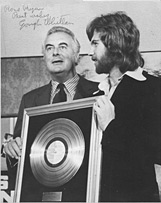 Ross made a memorable appearance at the 1974 Sunbury Festival
in January, followed up by the release of his third album in January
1974 and the subsequent release of the single "Orchestra Ladies". Propelled by the huge success of the "Horse" single, the Horse LP was also a major hit -- it sold 15,000 copies
within two
weeks, in March it was declared "gold", and it peaked at #3 nationally
in April 1974. It eventually earned Ross three gold record awards and
stayed in the charts for 17 weeks. In March Ross made another
short US trip, performing concert and clubs dates, after which he
briefly returned home, when Prime Minister Gough Whitlam presented him
with gold record awards for both the album My Name Means Horse
and "I am Pegasus". In May he returned to the USA, joining Judy
Stone and Rolf Harris to represent Australia
at Expo '74 in Spokane, Washington, and he also toured Canada with
Helen Reddy.
Ross made a memorable appearance at the 1974 Sunbury Festival
in January, followed up by the release of his third album in January
1974 and the subsequent release of the single "Orchestra Ladies". Propelled by the huge success of the "Horse" single, the Horse LP was also a major hit -- it sold 15,000 copies
within two
weeks, in March it was declared "gold", and it peaked at #3 nationally
in April 1974. It eventually earned Ross three gold record awards and
stayed in the charts for 17 weeks. In March Ross made another
short US trip, performing concert and clubs dates, after which he
briefly returned home, when Prime Minister Gough Whitlam presented him
with gold record awards for both the album My Name Means Horse
and "I am Pegasus". In May he returned to the USA, joining Judy
Stone and Rolf Harris to represent Australia
at Expo '74 in Spokane, Washington, and he also toured Canada with
Helen Reddy.
Over the next few years Ross made guest appearances on all the
top television shows from The Paul
Hogan Show to Hey Hey
It's Saturday; a clip of Ross' appearance on the Hogan show
has survived and recently surfaced on YouTube. He hosted his own pop TV
program,
Rock Show,
and continued to release fine singles and albums, although he was increasingly ignored by radio. During this period EMI also
recorded Ross's solo performances at various campus gigs for a
projected live album, but this never came to fruition because of a
mishap -- the tapes were accidentally mis-labelled by Peter
Dawkins' secretary, resulting in them being taped over with a production master of a popular
'1001 Strings' recording!
Prior to '75, Ross's live performances had been largely solo
outings, so he now decided to extend his musical palette, and he
undertook his first tour backed by a full band -- in this case,
country-rock group Stuart & McKay, which comprised Ian Stuart
(guitar, vocals), Ken McKay (guitar, vocals), John Griffin (bass) and
Doug Bligh (drums). In June 1975 EMI released his third album, After
the Applause and two singles, "Blue Chevrolet
Ballerina" / "Send Me
the Pillow" (which reached #38 in June, his final chart entry) and
"Sedel
(Never Smiled at Me)" / "Love Song to You All" (August). Ross himself
rates
this LP as containing some of his best songs.
To promote the album, Ross formed the first of a series of
all-star backing groups, Cahoots, and over the next few years he
alternated solo tours with tours with these hand-picked outfits. To
keep things fresh, Ross renamed the band for each major tour --
Cahoots,
The Ross Ryan Brothers, The Redeemers, Ross Ryan's Tonight Show, etc --
and formed a new line-up drawn from the best musicians in the country.
Some of the players who backed Ross over this period include Ace
Follington (Chain,
Cleves,
Australia, Richard Clapton Band), Eric McCusker (Captain
Matchbox, Mondo Rock), Ralph Cooper (Windchase, Air Supply),
Nigel Macara (Tamam
Shud/Ariel),
Toivo Pilt (Sebastian
Hardie/Windchase), Peter Gifford (Midnight Oil), and Tony
Slavich (Ariel / Richard Clapton Band). Guitarist Broc O'Connor also
played in most of these line ups, stayed on with Ross in the shortlived
Rambling Duo Brothers and became a long-term collaborator.
His fourth album, Smiling
for the Camera
was released in April
1977, along with the single "Who Am I?". The album produced two further
singles: the witty "Happy Birthday to Me" / "To Be Alone with You"
(August
1976), and "Dancing" / "Anthem" (August 1977). Produced by Rick Formosa
(ex-Little River Band) the session band comprised some of Australia's
leading musicians, including Formosa on guitar and mandolin, Tony
Buchanan (sax, flute), the late Roger Frampton (piano), Adrian Scott
(keyboards, Air Supply), Les Young (bass) and Jim Duke-Yonge (drums; ex-Pirana).
Unfortunately, neither the album nor the singles charted, and
the changing trends in music with the emergence of punk and New Wave
saw the singer-songwriter 'genre' being perceived as "old hat" by
record
companies and radio programmers. Ross's EMI contract came to an end
after Smiling for the
Camera, so he set off on an overseas holiday
covering Europe, England and the USA. Following his departure from the
label, EMI released a compilation of Ross’ best tracks called
I Thought This Might
Happen 1973-77. During 1977, Ryan supported US
visitors Roberta Flack and Dr Hook on their respective Australian
tours.
In 1978, Ross teamed up again with Mike Meade (who had just
finished his stint with Ray Burgess as co-host of ABC music show
Flashez).
They and Leo Bradney-George hosted, wrote and acted in twenty half-hour
comedy shows in a series for the ABC entitled Give 'Em Heaps.
Ostensibly a children's show, the show soon developed a cult following
with older viewers, due in large part to Ross's ability to infuse
alternate layers of meaning to the material, particularly comedy songs
like "I Love My Horse". In April 1980, Ross issued a new
single on Polygram, "Chaplin
and Harlow" / "Postmark Paradise", and a final single on the 7 label
(through Powderworks) in April 1981, "Hello Stranger" / "The Ballad of
the
Double Bay Batman". He continued to tour, and his next band, Ross Ryan
and the Redeemers, featuring Toivo Pilt, Broc O'Connor plus Roy Zedras
(bass) and the legendary Louis Burdett (drums).
In 1985, Ryan supported the iracsible Van Morrison on his
first Australian tour,
with a backing band comprised Roy Zedras, Gus McNeil (sax; ex-Nomads),
Alex Pertout (percussion) and Marcus Holden (fiddle). Always on the
lookout for new ideas, he also branched out into a new venture around
this time, creating a one-man audio visual show. With typically
self-deprecating humour, he called it Sing The One About The Horse.
The autobiographical story was embellished with new songs, old faves, a
plot, comedy, slides and pre-recorded tapes. Ross toured the show
successfully, and it was included as part of the Adelaide Fringe
Festival. (It also anticipated by a decade the current trend for such
one-man "retrospective" shows, like Ray Davies' successful
"Storyteller" tour).
In the late 80s, Ross relocated to Melbourne and issued a
series of cassette Albums like The
Lost Ross Ryan Album, The
Official
Ross Ryan Bootleg and You
Can Trust Me, I'm a Musician. Having seen the
potential of the emerging computer technology, he used them to augment
yet another one-man performance, You
Can Trust Me (I'm A Musician),
with the computer providing both the sequenced musical backings, and
some very original comedy. A recording of one performance from its
season at the Troubadour, was released as a collector's-item cassette,
which Ross sold at gigs.
By now, Ross's talent for comedy was being more widely
recognized and offers of comedy gigs were as frequent as those for his
music. He became a regular solo performer at comedy festivals and he
also worked on a number of radio and live shows with comedians
Steve Blackburn and Mary Kenneally (better known as "Tim
& Debbie"). In 1990, he wrote and performed a successful revue
for the Melbourne Comedy Festival, called Les Boys (A Masculine
Sensation) with Rod Quantock, Lynda Gibson and Geoff
Brooks. Around
this time EMI also issued his first music on CD, an anthology called
The Greats of Ross
1973–1990, which included old favourites,
plus previously un-issued material from Ross's post-EMI
years. Ross's talent with words and music has seen him
continue to
expand his work in both areas. He composed the music for an ABC
documentary entitled "The Way We Are", and wrote feature articles for
The Age
newspaper (on Mick Jagger's 50th birthday) and the Financial
Review (on the Tamworth Country Music Festival).
Ross had started in the industry with the intention of
producing records, so when he established G.I. Recorders with Broc
O'Connor, he was finally able to indulge this passion. In the role
of producer-engineer, Ross has produced material for both new
and
established acts across a broad a range of styles -- blues with Spectrum
(Spill),
country with Paul Wookey, traditional Irish with The Wren Boys,
spiritual rock'n'roll with Mike Meade (Avatar) and the
award winning
country album Only
Burning Me by Dale Juner. During this period he also
worked as sound designer for the Playbox Theatre's production
of Rising Fish
Prayer.
Into the 21st century, Ross continues
to ply his craft -- and
his good humour -- on stage, record and through his "partially
award-winning" website coathanger.com. A detailed history
of Ross's career, written by Paul Mc Henry, is also available from the
site. His most recent album One Person Queue came out in 2003. Regrettably, Ross has recently had to report:
"... a sense of
déjà vu when we were recently informed by EMI
that they were unable to locate the second side of After The
Applause (the bearded, intense follow-up to the Horse
album. Having
just glanced at the list of tracks in question, we fully appreciate
that this isn't exactly the burning of the library at Alexandria; but
it's still unfortunate. Sadly, the B-side to the "Blue Chevrolet
Ballerina" single, "Send Me The Pillow You Dream On (I Want To Start A
Coalmine)" is also missing -- to many, a much greater loss."
In happier news, Ross' landmark 1974 LP My Name Means Horse has
been reissued on CD by Gil Matthews and Ted Lethborg's Aztec Music label. The CD includes two bonues tracks, "Blood On The Microphone" (1984) and a live acoustic version of "I Am Pegasus" from GTK in 1973.
Discography
Singles (to 1975)
1972
"Sounds of Peppermint"
(split single, shared with The
Statesmen's "Keep on Truckin'")
July 1973
"I Don’t Want To Know About It" / "Making the Same
Mistakes" (EMI 10201)
Nov. 1973
"I Am Pegasus" / "Country Christine Waltz" (EMI 10300)
June 1975
"Blue Chevrolet Ballerina" / "Send Me the Pillow" (EMI)
1974
"Orchestra Ladies" / "606" (EMI 10463)
Aug. 1975
"Sedel (Never Smiled at Me)" / "Love Song to You All" (EMI)
Albums
1971
Homemovies
(private pressing, RR, 1971)
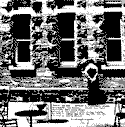
Homemovies
(back cover)
1973
A Poem You Can Keep
(EMI)
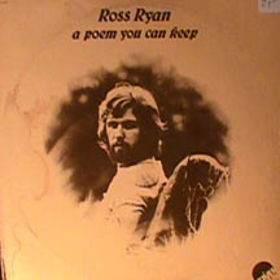
Original(?) LP cover design
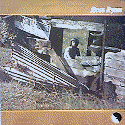
Alternate(?) cover design
1974
My Name Means Horse (EMI) LP
re-released on CD in 2007 by Aztec Music (AVSCD-024)
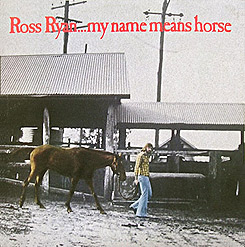
- "You Put Me On"
- "Orchestra Ladies"
- "Don’t Look To Me"
- "There Is No Pain"
- "Blood On The Microphone"
- "Nobody Waved Goodbye"
- "I Am Pegasus"
- "Battle Song"
- "Edith Child"
- "606"
- "A Jules Song"
- "Sing-Along-Horse-Song"
Bonus Tracks on CD:
- "Blood On The Microphone" – 1984
- "I Am Pegasus" – Live from GTK, 1973
1975
After the Applause
(EMI)
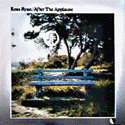
1976
Smiling for the Camera
(EMI)
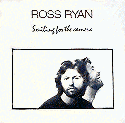
1977
I Thought This Might
Happen - Ross Ryan
(1973–1976) (EMI)
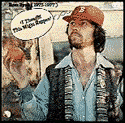
1990
The Greats of Ross
1973–1990 (CD compilation,
EMI/Axis).
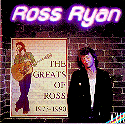
2003
One Person Queue
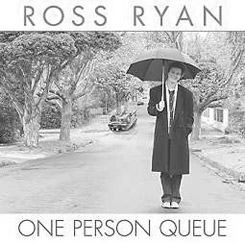
References/Links
Special
Milesago"thanks!" to
Mike Meade and Ross. All
images courtesy of the Ross Ryan website.
Ian McFarlane
Australian Encylopedia
of Rock &
Pop (Alen & Unwin, 1999)
Noel McGrath
Encyclopedia of
Australian Rock (Outback Press, 1978)
Ross Ryan
rossryan.com
- "The largest Ross
Ryan website in the world"
Rate Your Music: Ross Ryan
http://rateyourmusic.com/artist/ross_ryan
Australian Folk Song Discography
http://folkstream.com/data/AFS_M-Z.html
video interview with Ross Ryan
http://video.aol.com/video-detail/ross-ryan-interview-part-1-video/1144949629
Ross Ryan on YouTube:
"Cool River" (from One Person Queue)
"I Am Pegasus" - Paul Hogan Show, 1974
 Ross
Ryan is one of Australia's most
respected and successful singer-songwriters. Like his contemporaries Greg Quill and Mike
McClellan, he emerged from the folk scene, and enjoyed brief
chart
prominence in the mid-70's with his 1974 hit single "I Am Pegasus", for
which he is probably best remembered these days. But like Greg and
Mike, Ross'
shortlived burst of fame (and the fickle nature of the music
scene) led to an undeserved tag as a 'one-hit wonder', and this has
tended to obscure the
body of fine work Ross produced before and since his short burst of
chart success. Ross's songs have also
been covered by leading Australian artists such as John Farnham ("I
Must
Stay") and Slim Dusty ("Isa"). Humour has always been an important part
of
Ross's writing, and he has brought this aspect to the fore in recent
years with his own successful one-man show at the Adelaide Fringe
Festival, a revue at the Melbourne Comedy Festival, and recent
collaborations with comedy artists like Rod Quantock.
Ross
Ryan is one of Australia's most
respected and successful singer-songwriters. Like his contemporaries Greg Quill and Mike
McClellan, he emerged from the folk scene, and enjoyed brief
chart
prominence in the mid-70's with his 1974 hit single "I Am Pegasus", for
which he is probably best remembered these days. But like Greg and
Mike, Ross'
shortlived burst of fame (and the fickle nature of the music
scene) led to an undeserved tag as a 'one-hit wonder', and this has
tended to obscure the
body of fine work Ross produced before and since his short burst of
chart success. Ross's songs have also
been covered by leading Australian artists such as John Farnham ("I
Must
Stay") and Slim Dusty ("Isa"). Humour has always been an important part
of
Ross's writing, and he has brought this aspect to the fore in recent
years with his own successful one-man show at the Adelaide Fringe
Festival, a revue at the Melbourne Comedy Festival, and recent
collaborations with comedy artists like Rod Quantock. Ross made a memorable appearance at the 1974 Sunbury Festival
in January, followed up by the release of his third album in January
1974 and the subsequent release of the single "Orchestra Ladies". Propelled by the huge success of the "Horse" single, the
Ross made a memorable appearance at the 1974 Sunbury Festival
in January, followed up by the release of his third album in January
1974 and the subsequent release of the single "Orchestra Ladies". Propelled by the huge success of the "Horse" single, the 







